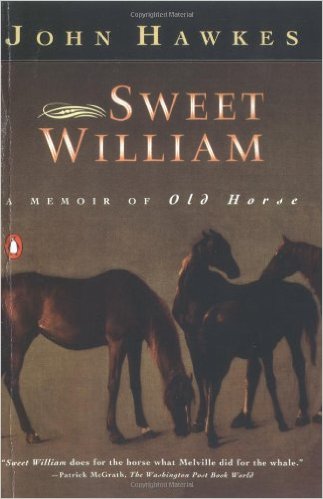On first reading this wondrous 1993 novel, I thought it one of the truest, most moving, empathetic books I had ever read. It stuck in my mind as a bravura literary feat – yet one that was overwhelmingly sad. Reading it again this month – pausing several times in tears – I was glad I gave it another try. For it still seems to me a miracle of a book.
Sweet William (the flower of that name suggested both enchantment and gallantry in Victorian England) proposes to be the autobiography of a horse. And what a horse! Witty and perceptive, blessed with a prowess with words that most human writers, this one included, could only envy, William is not an obviously sympathetic character. A thoroughbred, he is an unapologetic snob who deplores ‘vulgar speech,’ and carries the aristocrat’s sense of entitlement. And he is an avowed misanthrope, and dangerous.
Yet this reader’s heart remained with William, even through his (understandable) savagery. Plunged inside the skin of the horse, I felt his sensory burdens, sufferings and fears: his keen sensitivity to sound, smell and touch (even the weight of a saddle pad is at first painful). I knew the terrible fate of a 2,000 pound sentient being born in servitude to man. That ‘no horse is safe’ in the world of men – the real beasts, with a couple exceptions.
‘Born to bliss’ on a small American horse farm, William’s first tranquility is soon aborted. And here lies the real challenge to this reader: for I cannot read this book without a visceral reaction to the cruelty and neglect William endures. But just when the story might have become unbearable, rescue arrives, there is a sustained stretch of comic relief, and an end I didn’t see coming.
Alternately writing in an elegant, old-fashioned prose that befits Sweet William and his ‘Master,’ and in brief, impressionistic passages that convey the essence of the horse’s experience, Hawkes unfolds the horse’s world in all its brutality, but also its poetry: the lemony-colored oats of his first barn; ‘the song of the brook’; the warmth of his mare; the ‘sparkling wet world’ seen in ‘morning light.’
I love this book for its deep empathy and wizardry, its sheer audacity, and its great respect for the horse – an animal I rode joyously as a girl – to whom clean water, good feed, a sheltering barn, an amiable companion, enough grass and space to run in, and basic human kindness is everything. (‘In the adversities of this horse’s life find yours,’ Hawkes challenges us in a cautionary note – and we do, though I found myself thinking more of Syrian refugees, and all the other homeless, unprotected sentient beings to whom the horse’s basic needs would also be everything.)
Reader, saddle up, and hold on: knowing that at times you will pray for the ride to end, to be safely delivered back to the barn. I promise there is joy, too, along the way, along with humor, decency, and tenderness. You won’t always cry in sorrow. And an enchantment only hinted at in William’s name awaits you.
Photograph © Markus Spiske








